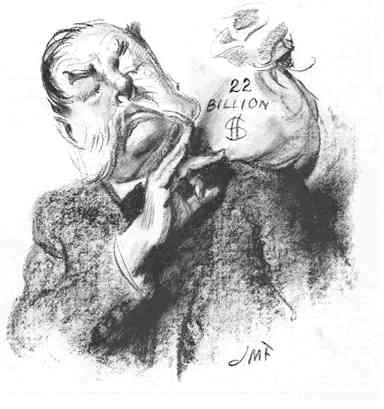Our Financial Oligarchy, Other People's Money, and How The Criminal Bankers use it, 1914

Cover illustration of Harper's Weekly, November 29, 1913 by James Montgomery Flagg
- By Justice Louis Brandeis
Louis Dembitz Brandeis was an American lawyer and the Supreme Court justice of the United States from 1916 to 1939.
In 1912, Woodrow Wilson campaigned for President using many Progressive ideas about strengthening the economy: banking reform, tariff reduction and the elimination of monopolies and trusts. The consolidation of these ideas became known as the New Freedom.
After Wilson's election, Louis Brandeis (who was responsible for many of Wilson's ideas in the first place) wrote a series of articles for Harper's Weekly which outlined why the New Freedom was necessary and how best to implement it. In 1914, the articles were collected in book form and published under the title Other People's Money--and How the Bankers Use It.
Brandeis' central thesis was that the large banking houses were colluding with businessmen to create trusts in America's major industries. Brandeis felt that not only did trusts stifle competition, but also they became so large that they became unable to operate efficiently.
Brandeis backed up his arguments with facts--copious facts gleaned from his battles against J. P. Morgan and Charles Mellen in the New Haven Railroad merger battle and from the Pujo Committee--a House committee report that investigated the abuses of the "Money Trust."
Wilson was able to push through a number of laws regarding the regulation of business and trusts, but in many ways, due to mergers and stock manipulation, conditions in the business world today remain the same. Many of the details in Other People's Money may be dated, but its central ideas remain relevant--so much so that is still in print almost 90 years after it was first published.
Chapter 1: Our Financial Oligarchy
Chapter 2: How The Combiners Combine
Chapter 3: Interlocking Directorates
Chapter 4: Serve One Master Only!
Chapter 5: What Publicity Can Do
Chapter 6: Where The Banker Is Superfluous
Chapter 7: Big Men And Little Business
Note: All illustrations on these web pages are from the original Harper's Weekly articles that made up Other People's Money.
Justice Louis D. Brandeis, who had been a brilliant attorney, had no previous judicial experience before being named to the United States Supreme Court. Justice Brandeis is generally regarded as a great thinker and a judicial pioneer. He also was the first Jewish member of the United States Supreme Court. Read more...


